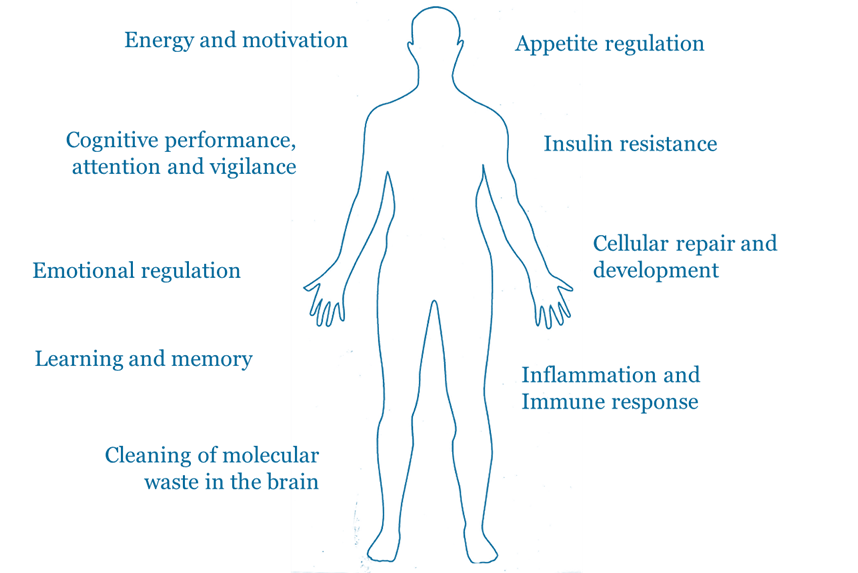Lack of sleep is a result of a multitude of factors, including our habits, our environment, our stress and emotional levels, the food we consume, etc. Some are within our control while other are external factors, such as a newborn baby, that can temporarily or chronically impact the quality of our sleep.
It is estimated that up to 30% (1 out of 3) of individuals are not obtaining sufficient sleep on a nightly basis. For a healthy adult, it is assumed that required sleep time will be somewhere between 7 and 9 hours of sleep. However, a person’s nightly sleep need is also based on a number of factors from genetics to physiological and endocrinological composition (ex. hormone levels), as well as from temporal and external influences.
A general and simple way to measure our individual sleep need is to self-identify the number of hours that would be needed in order feel awake and alert the subsequent day. For me, I generally need about 7.5 – 8 hours of sleep to feel good, alert and attentive the following day. Insufficient sleep is characterized by the difference between a person’s sleep need and their actual nightly sleep time.
Insufficient sleep, or sleep loss, can be the outcome of a one-off or short-term event (acute) or a continuous activity that happens night after night, week after week (chronic). It can be that of a full night with no, or very little sleep (sleep deprivation). These are typically one-off cases, such as pulling all-nighters to study before an exam. However, what is more commonly seen is that one’s night of sleep is shortened (sleep restriction) as a consequence of a late bedtime and/or early wake time, or experiencing difficulties falling asleep or staying asleep throughout this bed-time period.
In general, we tend to end up falling asleep at a too late of a time for the required hour at which we need to wake up the next morning to go to work, go to school, take care of the family, etc. This restriction in our night-time sleep tends to occur repetitively, night after night, where sleep debt is accumulated over the course of the week.
Often, when possible, we try to recuperate from the lack of sleep during the week by sleeping in on the weekends, however this also has undesired repercussions. Overall, it is better to maintain a consistent routine, even on weekends.
Evening chronotypes are, unfortunately, also more prone to experiencing insufficient sleep as they are biologically programmed to go to bed and wake up later, making it more difficult for them to fall asleep at an earlier time in the evening, in addition to difficulties waking up at the required time in the morning. As such, they are at a disadvantage to the socially constructed schedule of an 8am-4pm (alternatively, 7am-3pm or 9am-5pm) work day.
Moreover, it is important to remember that time in bed does not necessarily equal time asleep and time asleep does not necessarily equal good quality sleep. Although we may be sleeping throughout the night, our sleep can be disrupted and fragmented. Awakenings and micro-awakenings (to which we are not consciously aware of their occurrence) may be preventing us from obtaining sufficient quantity of the different sleep stages. Note that if you are getting a sufficient sleep duration each night but you continue to feel sleepy during day, I would strongly recommend that you to talk to your health physician as there may be an underlying condition interfering with the quality of your sleep.
The more common symptoms of insufficient sleep is increased daytime sleepiness and a reduced level of alertness throughout the day. Sometimes these can even persist for a few days following sleep loss. However, sleep is also known to play a role in a plethora of functions, where lack of sleep can increase the risks and outcomes on our physical health, mental health, performance and overall well-being. The following outlines just a few of the known areas of impacts of insufficient sleep.

Overall, the bigger the loss of sleep the night prior, the bigger the effects will be felt the subsequent day. Moreover, there is also a cumulative effect over multiple nights of insufficient sleep. Although one hour of sleep loss per night may in itself not seem like a big thing the following day, but multiply that by 5 and at the end of the week, it accumulates to the point where alertness and reactiveness can become greatly impaired.
With the impact of sleep on our health, well-being and performance, it is important to ensure that sufficient sleep is obtained on a nightly basis and that, as must as possible, sleep disturbances and loss are kept to a minimum. Becoming aware of the impact of sleep loss on our self and our performance is key in placing importance and prioritizing our slumber at the end of the day. If and when needed, utilize sleep hygiene methods to support a good night’s sleep; many of which can be found in the Sleep Hack section of this website.
Selected Supporting References
- Hublin, C., Kaprio, J., Partinen, M., & Koskenvuo, M. (2001). Insufficient sleep—a population-based study in adults. Sleep, 24(4), 392-400.
- Carskadon, M. A., & Dement, W. C. (1981). Cumulative effects of sleep restriction on daytime sleepiness. Psychophysiology, 18(2), 107-113.
- Williamson, A. M., & Feyer, A. M. (2000). Moderate sleep deprivation produces impairments in cognitive and motor performance equivalent to legally prescribed levels of alcohol intoxication. Occupational and environmental medicine, 57(10), 649-655.
- Alhola, P., & Polo-Kantola, P. (2007). Sleep deprivation: Impact on cognitive performance. Neuropsychiatric Disease and Treatment, 3(5), 553–567.
One thought